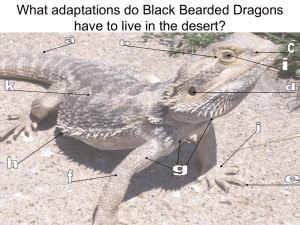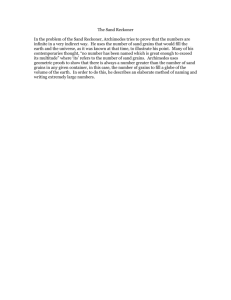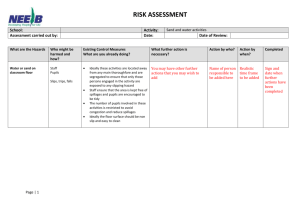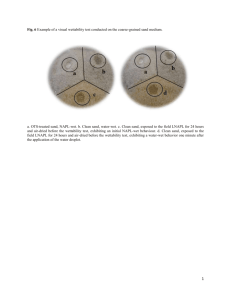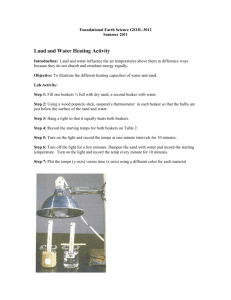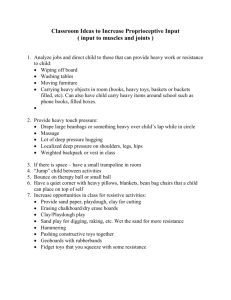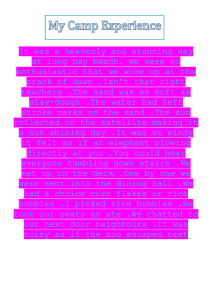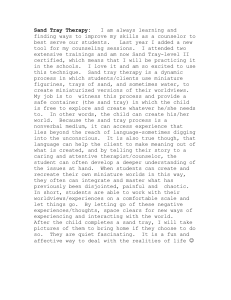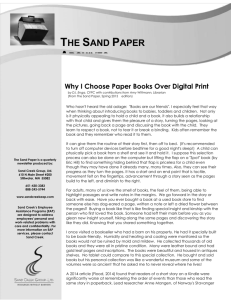Full interview with Massimiliano Busti for Blow Up (Italian magazine
advertisement
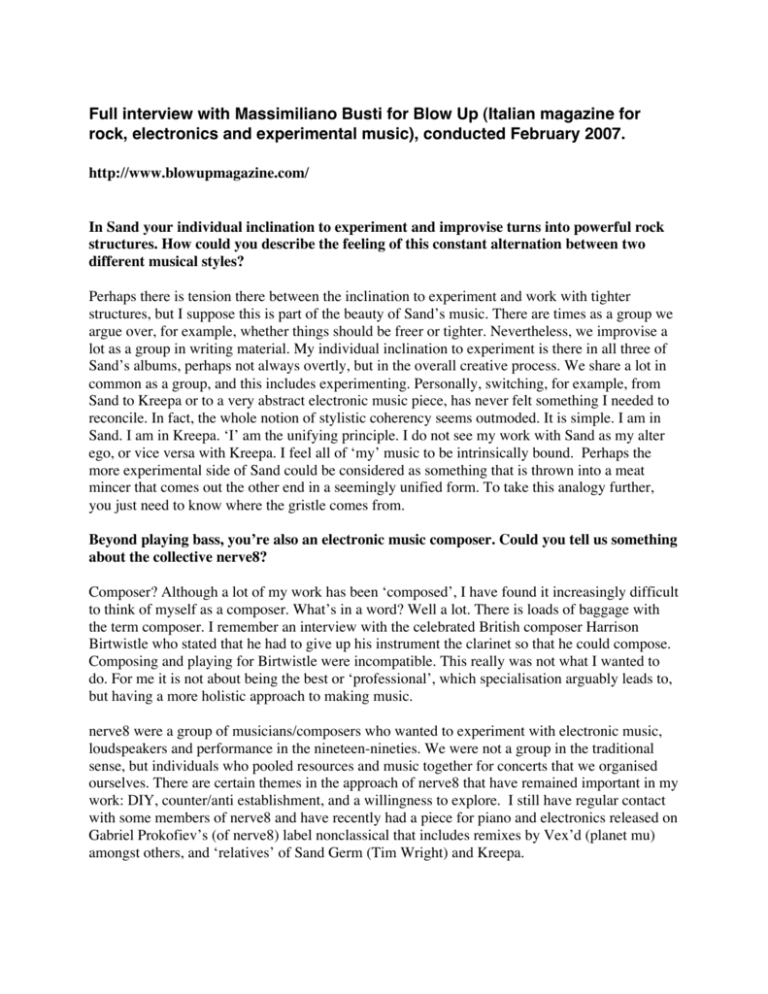
Full interview with Massimiliano Busti for Blow Up (Italian magazine for rock, electronics and experimental music), conducted February 2007. http://www.blowupmagazine.com/ In Sand your individual inclination to experiment and improvise turns into powerful rock structures. How could you describe the feeling of this constant alternation between two different musical styles? Perhaps there is tension there between the inclination to experiment and work with tighter structures, but I suppose this is part of the beauty of Sand’s music. There are times as a group we argue over, for example, whether things should be freer or tighter. Nevertheless, we improvise a lot as a group in writing material. My individual inclination to experiment is there in all three of Sand’s albums, perhaps not always overtly, but in the overall creative process. We share a lot in common as a group, and this includes experimenting. Personally, switching, for example, from Sand to Kreepa or to a very abstract electronic music piece, has never felt something I needed to reconcile. In fact, the whole notion of stylistic coherency seems outmoded. It is simple. I am in Sand. I am in Kreepa. ‘I’ am the unifying principle. I do not see my work with Sand as my alter ego, or vice versa with Kreepa. I feel all of ‘my’ music to be intrinsically bound. Perhaps the more experimental side of Sand could be considered as something that is thrown into a meat mincer that comes out the other end in a seemingly unified form. To take this analogy further, you just need to know where the gristle comes from. Beyond playing bass, you’re also an electronic music composer. Could you tell us something about the collective nerve8? Composer? Although a lot of my work has been ‘composed’, I have found it increasingly difficult to think of myself as a composer. What’s in a word? Well a lot. There is loads of baggage with the term composer. I remember an interview with the celebrated British composer Harrison Birtwistle who stated that he had to give up his instrument the clarinet so that he could compose. Composing and playing for Birtwistle were incompatible. This really was not what I wanted to do. For me it is not about being the best or ‘professional’, which specialisation arguably leads to, but having a more holistic approach to making music. nerve8 were a group of musicians/composers who wanted to experiment with electronic music, loudspeakers and performance in the nineteen-nineties. We were not a group in the traditional sense, but individuals who pooled resources and music together for concerts that we organised ourselves. There are certain themes in the approach of nerve8 that have remained important in my work: DIY, counter/anti establishment, and a willingness to explore. I still have regular contact with some members of nerve8 and have recently had a piece for piano and electronics released on Gabriel Prokofiev’s (of nerve8) label nonclassical that includes remixes by Vex’d (planet mu) amongst others, and ‘relatives’ of Sand Germ (Tim Wright) and Kreepa. Your collection of self-made instruments is quite fascinating, a very poetic way to graft electronics into raw materials… Do you use them also in Sand’s Albums? The term graft is good. I always think of the ‘performance’ with these instruments as starting on my workbench at home. The process of creating these ‘things’ is close to a musical ‘composition’ for me: the device creates a process from which subsequent sound or interaction is made. Some of the self-made instruments provided great starting points for tracks on the Dalston Shroud. Tim would sample bits, or Neil (guitar) and I would improvise together sections of tracks. So, yes, the self-made instruments are there, but Sand is all about a group, five musicians working together, a collective effort. We all have lots of musical potential, but it is about choosing what works as Sand. How would you describe Kreepa’s music? Is your first ‘official’ album going to be published in January? Electro-noise and industrial jazz. I like both of these. Yes, finally an ‘official’ Kreepa album this year, although we have previously had a few tracks released on compilations. We have been working on material for the last six years and have also done a lot of gigs during this period. The album is being released on the new label monium that has been set-up by Nic Bullen, founder member of Napalm Death and of Scorn, and features the amazing British saxophonist Paul Dunmall. Kreepa have also had ongoing collaborations with Bullen’s current group Black Galaxy and have recorded an album together for Christof Kurzmann’s label Charhizma to be released later this year. You seem to be quite interested in the relationship between the ‘machine’ (the laptop) and the human body during the musical performance. Kreepa was involved in the Oik project trying to experiment with the results of STEIM’s research. How was working with the Dutch composer Michel Waisvisz who undertook the whole project? Machine, yes, but this extends beyond computers and includes the mechanical and electronic circuits. The human body is at the centre of my music making. I sometimes think that making music is all about touch and not about the ear or listening. I create patterns with my hands and feel vibrations through my fingertips. Having spent many years thinking about how computers could be used in performance, I always end up back at the body: for example, how to input data, or interface with a certain technology. Converting a meat mincer/grinder (one of my self-made instruments) into a sound generating device is what I consider to be ‘real’ technology. Working at STEIM (Studio for Electro-instrumental Music), Amsterdam, taught me a lot, mainly all the things I did not want to do in the future. Kreepa were very much given the key to the studios at STEIM and left to our own devices. Waisvisz was not really there. Just his spirit I like to think. Some of his earlier work such as the Crackle Family and The Electricity particularly interested me. The Oik project is/was all about hacking commercially available hardware to create economic musical interfaces, a process of bastardisation. I was drawn to this. Again, this approach links to my other work.
